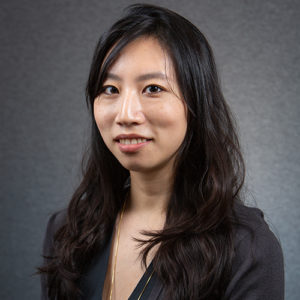 This post was written by Joan Hua, who received an ARL + DLF Fellowship to attend the 2019 DLF Forum.
This post was written by Joan Hua, who received an ARL + DLF Fellowship to attend the 2019 DLF Forum.
Joan is an MLIS graduate student at the University of Washington Information School. Her professional experiences and interests concentrate on the intersection of digital scholarship, data curation, metadata, and critical digital pedagogy. Her ideal goal is to incorporate digital methods in the management of information in ways that help solve human problems and effect social change. She is currently conducting an internship at Washington State Department of Transportation on open data publishing.
Like a typical working graduate student and an early-career professional, I have multiple and sometimes metamorphosing professional identities. As a result, I sometimes feel awkwardly unsure how to present myself at professional convenings such as the DLF Forum. (To illustrate, I presented a lightning talk on an Open Data Literacy project I did as a student at the University of Washington iSchool, while I recently transitioned from an instructional design and technology job to manage an oral history project.) But it turned out that it was not awkward at all. In fact, it made me realize this is the beauty of DLF: various aspects of the digital processes intersect and feed into one another, and the Forum allowed the multidimensional problems to come together in fluid conversations or be presented side by side. Attending the Forum, I encountered a multitude of relevant information—from project management, digital preservation, data services, tidying and transforming metadata, to community engagement, and so on—and somehow they all resonated with the wide array of professional and academic interests I have in a cohesive way, regardless of which professional hat I felt I was wearing.
For the rest of this blog post, I chose to wear the oral history project manager hat and give some oral history-themed highlights of my experience.
As I begin to identify and engage individuals who can serve as narrators for an oral history project I am developing, I am thinking actively about content curation, and my top-of-mind questions are those that relate to representation, power relationships, and notions of authority and authenticity. Sessions like t6c with “oral history keepers” gave me inspiring examples. Additional side conversations have influenced the ways in which I am thinking about my position as an outsider—in the sense of geographic location, identity, or shared experiences—conducting interviews. Even though the session was not about oral history per se, m3b: Stop, Collaborate, and Listen! Reaching Across Programs to Preserve Student Digital Content was also enlightening to me. The discussions led me to think about the ephemerality of student work and to recognize that students can represent both vulnerable groups as well as valuable contributors. The “decentering the archivists” approach, discussed specifically by archivist Elvia Arroyo-Ramírez (UC Irvine), is something I continue to think about and seek to apply in my own practices.
#m3b #DLFForum great examples of student organization archival initiatives, including from UC Irvine https://t.co/gVdEtnyJp2
— Scott is a name that’s good enough for now (@ess_ell_zee) October 14, 2019
I have often found the traditional model of presenting oral history allows for a rather narrow, or even esoteric, set of uses. As the browse function often consists of only a list of names and perhaps subject terms, researchers often need to come with prior knowledge about specific individuals. There is little chance for unexpected discoverability by a wider audience—e.g., undergraduate researchers just learning about oral history through a class assignment. After that, intense seriousness and interest seem to be a prerequisite for listening through multiple recordings in full. Transcriptions, even with the help of automated tools, are time- and labor intensive. And therefore, in my mind, they should be created as more than a fixed document to read through. Rather, the text can be treated as raw data to help surface patterns and themes, opening up immense potential for interacting with oral history materials. Forum presentations such as those in the Collections as Data (m2e) session have helped me refine and articulate these thoughts and have gotten me to dream about experimenting with transcripts and other textual materials to turn them into linked data. Interested in treating oral history materials as data, I also gained helpful insights into some tools that can help me make progress on this front. An example is the new ContentBuilder tool developed by University of Idaho’s Digital Initiatives team.
Former @IDAH_IU @HASTACscholars Olivia Wickle describing how Lib-Static makes it easier to export metadata in different forms & work with collections as data. Exciting! #DLFforum #m1e pic.twitter.com/tT4EzfVQcN
— Mary Borgo Ton (@maryeborgo) October 14, 2019
I am continuing my conversations with them to explore this possibility. And that gets to perhaps the most valuable and rewarding outcome of my DLF Forum experience—relationship building. I foresee myself continuing conversations with individuals I met at the Forum, and that, I believe, is what would lead to future collaborations and community building as we tackle ever-growing new challenges in the world of digital libraries.
